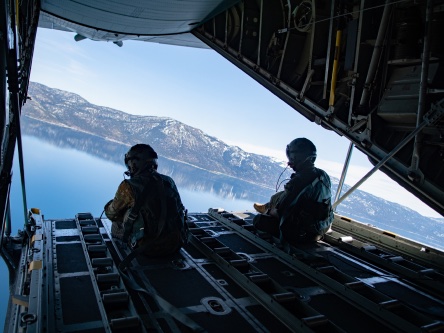
CAREERS Cyber Direct Commissioning Program
-
Who can apply?
This opportunity is open to qualified civilians between the ages of 17 and 42. The program is no longer open to current enlisted members.
What makes an ideal candidate?
There is no strict checklist of qualifications, but the CDCP program generally looks for candidates with a strong educational background, experience in cyber-related fields, technical skills, adaptability, a team mentality, leadership potential and a strong dedication to contribute to the Air Force’s mission. The program aims to attract a diverse pool of candidates with various skills and backgrounds to meet the varied needs of the Air Force’s cyber operations.
-
What level of education is required?
Consideration for the program requires applicants to hold a bachelor’s degree or higher, with advanced degrees preferred. STEM degrees are preferred, but not required. Work experience, training and/or certifications in cyber-related fields are also encouraged.
What AFOQT scores do I need to qualify?
The Air Force Officer Qualifying Test (AFOQT) is a standardized test used to assess the aptitude and abilities of individuals seeking to become officers in the United States Air Force.
For the Air Force Cyber Direct Commissioning Program, the minimum AFOQT scores required for the selection board are:
- 15 for the Verbal subtest.
- 10 for the Quantitative subtest.
Meeting or exceeding these minimum scores is a requirement for consideration by the selection board.
-
How do I apply?
The process for applying to the Air Force Cyber Direct Commissioning Program steps are listed below:
- Contact a Local Recruiter: You can apply for the Cyber Direct Commissioning Program by contacting a local Air Force recruiter. Inform the recruiter that you are interested in applying for the “The Air Force Cyber Direct Commissioning and Constructive Service Credit program.”
- Initiate the Application Process: The recruiter will guide you through the application process. They will provide you with the necessary information and paperwork to get started.
- Document Cyber Experiences: It’s essential to document your cyber-related experiences and qualifications. This information will help the review board assess your suitability for the program and align you with the appropriate Air Force Specialty Code (AFSC) preferences.
- Indicate AFSC Preferences: During the application process, you may be asked to indicate your preferences for AFSCs. Indicate 17X as your desired AFSC.
- Selection Process: Depending on your qualifications and preferences, you may be considered for the Cyber Direct Commissioning Program. If you indicate 17S or 17D as your top choice, your application will be forwarded to the latest commission board for consideration.
When Can I Apply?
Apply today as a 17D (Warfighter Communications Operations Officer) or 17S (Cyberspace Effects Operations Officer) in the Air Force Cyber Direct Commissioning Program, you can expect to have a range of roles and responsibilities related to communications and cyberspace operations. Here are some of the positions you may fill in these career fields:
For 17D (Warfighter Communications Operations Officer):
- Enterprise Architect: You may be responsible for designing and maintaining the overall architecture of the Air Force’s information systems and networks.
- Research and Development Specialist: This role involves conducting research and development activities to enhance the Air Force’s cyber capabilities, develop new technologies and stay ahead of emerging threats.
- Systems Requirements Planner: Especially in the X-Comm (Expeditionary Communications) world, you may be involved in planning and coordinating the technical requirements for communication systems in expeditionary settings.
- Cybersecurity Analyst: This role may involve monitoring and analyzing network traffic, identifying vulnerabilities, and implementing security measures to protect Air Force systems and data.
For 17S (Cyberspace Effects Operations Officer):
- Software Developer: You may work on developing and maintaining software and applications that are crucial for cyber operations and network security.
- Cyber Operator: This role typically involves conducting offensive and defensive cyber operations, including network monitoring, vulnerability assessments and cyber warfare tactics.
- Technical Directors: Leading technical teams and initiatives within the Air Force
- Contact a Local Recruiter: You can apply for the Cyber Direct Commissioning Program by contacting a local Air Force recruiter. Inform the recruiter that you are interested in applying for the “The Air Force Cyber Direct Commissioning and Constructive Service Credit program.”
-
What is Constructive Service Credit?
Constructive Service Credit (CSC) provides an opportunity for professionals with cyber related education and/or experience to be directly appointed to the Air Force in the ranks of lieutenant through colonel. CSC is used to determine initial grade, and rank. CSC is awarded during the commissioning board process based on three categories: advanced education, work experience and specialized training/certifications. The awarding of CSC is used to recognize and provide credit for an applicant’s relevant qualifications and expertise. The specific criteria for CSC in the Air Force Cyber Direct Commission Program include the following categories:
Advanced Education: Qualifying advanced education beyond a bachelor’s degree is considered in disciplines related to cyber operations and technology. The following fields are typically recognized for CSC:
- Software Development
- Software Engineering
- Systems Engineering
- Computer Science
- Computer Engineering
- Electrical/Electronics/Electromechanical Engineering
- Data Science
- Data Analytics
- Machine Learning
- Artificial Intelligence
- Cybersecurity
- Cyber Operations
- Digital Forensics
- Computer and Cyber Interdisciplinary Degrees
Work Experience: Qualifying experience includes a range of roles and responsibilities related to cyber operations and technology. Relevant work experience may involve the following areas:
- Cyber Operations
- Software Development
- Software Engineering
- Systems Development and Systems Engineering
- Capability Development
- Computer Programming
- Computer Engineering
- Security Engineering
- Network Security
- Industrial Control Systems
- Incident Response
- Risk and Compliance
- Cyber Governance
- Data Science
- Data Analytics
- Machine Learning
- Electrical/Electronic Engineering
- Cryptography
- Quantum Physics
- Mathematics
- Forensic Analysis
- Malware Programming
Specialized Training & Certifications: Qualifying specialized training includes courses and certifications related to technology, cyber operations, and security. Training and certifications in areas such as the following may be considered for CSC:
- Electronics Theory
- Information Technology
- Wired and Wireless Telecommunications
- Computer Networking
- Cloud Architectures
- Information Assurance
- Data Links Management
- Spectrum Operations
- Scripting
- Operational and Tactical Planning
- Supervisory Control and Data Acquisition Systems (SCADA)
- Vulnerability Assessment Techniques
- Operating System Environments
- Exploitation Techniques
- Threat Actor Lifecycle
- Malware Components and Techniques
- Mission and Terrain Analysis Techniques
- Large Force Employment
- Operational Planning
- Governing Cyberspace Operation Directives
Can a recruiter give me an idea of what my constructive service credit (grade calculation) would be?
Constructive service credit allows applicants an opportunity to enter into the Air Force from Lieutenant up to a Colonel based on experience, specialized training, and advanced education. The CDCP board consists of senior cyber leaders who carefully examine each applicant based on the criteria outlined in the program memo and recommend the amount of constructive service credit. This process is intended to be objective, repeatable, and fair; therefore, the recruiters should not speculate on the constructive service credit award.
Elevate and Accelerate your career
A career in the Air Force isn't just a job, it's a calling. The Cyber Direct Commissioning Program is a fast track to utilizing your valuable skills in the noblest way: to serve your country and protect your fellow countrymen from threats in cyberspace and beyond.
-
Cyber Direct Questions?
If you have further questions about our Cyber Direct Commissioning Program, please reach out to a recruiter below.
-
Civilians welcome.
Qualified civilians are eligible for an accelerated appointment into Cyberspace Warfare Operations career field with constructive service credit in the ranks of Lieutenant through Colonel. And it starts with a chat with a recruiter.







